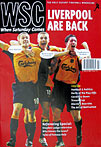 Mike Ticher thumbs through some of the classics of ref literature and finds a world of egotists and backstabbers
Mike Ticher thumbs through some of the classics of ref literature and finds a world of egotists and backstabbers
One of the first referees to write his autobiography (assisted by Kenneth Wolstenholme) also had one of the best stories to tell. At 37, Arthur Ellis was the youngest Wembley Cup final referee when he oversaw Newcastle v Arsenal in 1952, ran the line in the final match of the 1950 World Cup in front of 200,000 at the Maracana and was in charge of the notorious “Battle of Berne” (Brazil v Hungary) in the 1954 World Cup.
His 1956 effort, Refereeing Round The World, is typical of its era, a breathless and innocent tale of the rise and rise of “that smiling, likeable young fellow from Halifax”. The most interesting chapters are those that deal with Ellis’s trips abroad and his contradictory opinions about what he found. He is so suspicious of nefarious Continental ways that he carries photos of all the players when he refs foreign teams, checking them off at half-time for fear of crafty substitutions.
Ellis was exposed to enough South American football to know how good they were, yet could not bring himself to admit that they had already overtaken England. On tour in Brazil with Portsmouth in 1951 (played six, won none), he remarks: “The South Americans are brilliant players… Yet they spoil it… by their love of the unfair push or jersey pull. If only they would cut this out they would be world beaters.” World beaters? This only a year after he’d seen Uruguay win the World Cup.
The golden age of reflit, however, did not arrive until the 1970s when referees, newly exposed on television, became minor celebrities. Norman Burtenshaw’s Whose Side Are You On Ref? (1973) was the first and one of the best of the line, which expired with Clive Thomas’s By The Book (1984). Burtenshaw is great on the telling detail, such as the little parcel from the FA in the dressing-room before the 1971 Cup final, containing a pair of laces and a jockstrap.
He proudly boasts that he never spoke to players on the field unless he had to, and maintains a formal distance at all times. During the 1971 “clampdown” (a shocking 32 players booked in 15 matches) he sent off George Best for calling him “a fucking disgrace” at Stamford Bridge. “What’s your name?” Burtenshaw asks. “Best.” “Initial?”
He is also irritatingly predictable on foreigners, despite (like Ellis) lovingly detailing the way English players cheat. Sneaky fouls, he claims, “crept into the English game from the Continent long before Britain entered the Common Market”. But the book is saved by the period detail on hooliganism – Burtenshaw was attacked on the pitch at Millwall, though the club claimed he fainted – and his candid and mostly good-humoured judgments on the players of the day. He singles out Leeds, Arsenal and Man City as particular dislikes (Francis Lee is a “flanneller in the box”; Frank McLintock accuses him of being “bent” during the Cup final).
In similar vein at the other end of the decade is Pat Partridge’s Oh, Ref! (1979), though he leaves a more sour and self-righteous taste. The Co Durham whistler has a bad word for almost everybody, including surprising candidates such as Gordon Banks (“a player who believed in his own publicity”), Bobby Charlton (“one of the biggest moaners I have ever come across”), Jack Taylor (for criticising Clive Thomas on TV) and Joe Mercer, who unforgivably makes a rude comment about Partridge in front of his wife. Partridge, though, is mightily impressed by the military regime in Argentina, where he takes Peru v Poland in the 1978 World Cup. The organisers, he proclaims, “should have received a public apology in all the world’s newspapers”.
Between Burtenshaw and Partridge came Gordon Hill, who, with his Sgt Pepper moustache and outspoken liberal attitudes, was a kind of anti-ref, a brief whiff of early Seventies radicalism in the most unlikely of arenas. Hill – denounced by both Burtenshaw and Partridge for his use of “industrial language” on the field – is described without irony as “a trendy, rebellious personality” by Jason Tomas, collaborator on the hugely entertaining Give A Little Whistle (1975).
Hill, a teacher by profession, wanted to be mates with the players (“I will always look on Emlyn Hughes as a friend”) and enjoyed being seen in their company. But he admits the easygoing approach (he never sent a player off in a league match) was responsible for his worst games, a couple of rampant bloodbaths in 1971, and naturally it failed to win him friends in high places – the biggest game he ever took was the 1975 League Cup final.
Perhaps the only thing the groovy Hill shared with the buttoned-up Partridge and the more old-fashioned Burtenshaw (apart from a universal dislike of Peter Osgood) is a recognition of what makes refs tick. Hill calls it “a narcissus quality”, while Partridge admits that “all referees are egotistical”. Surprising, then, that so few of them have felt the need to tell us about it recently.
From WSC 173 July 2001. What was happening this month